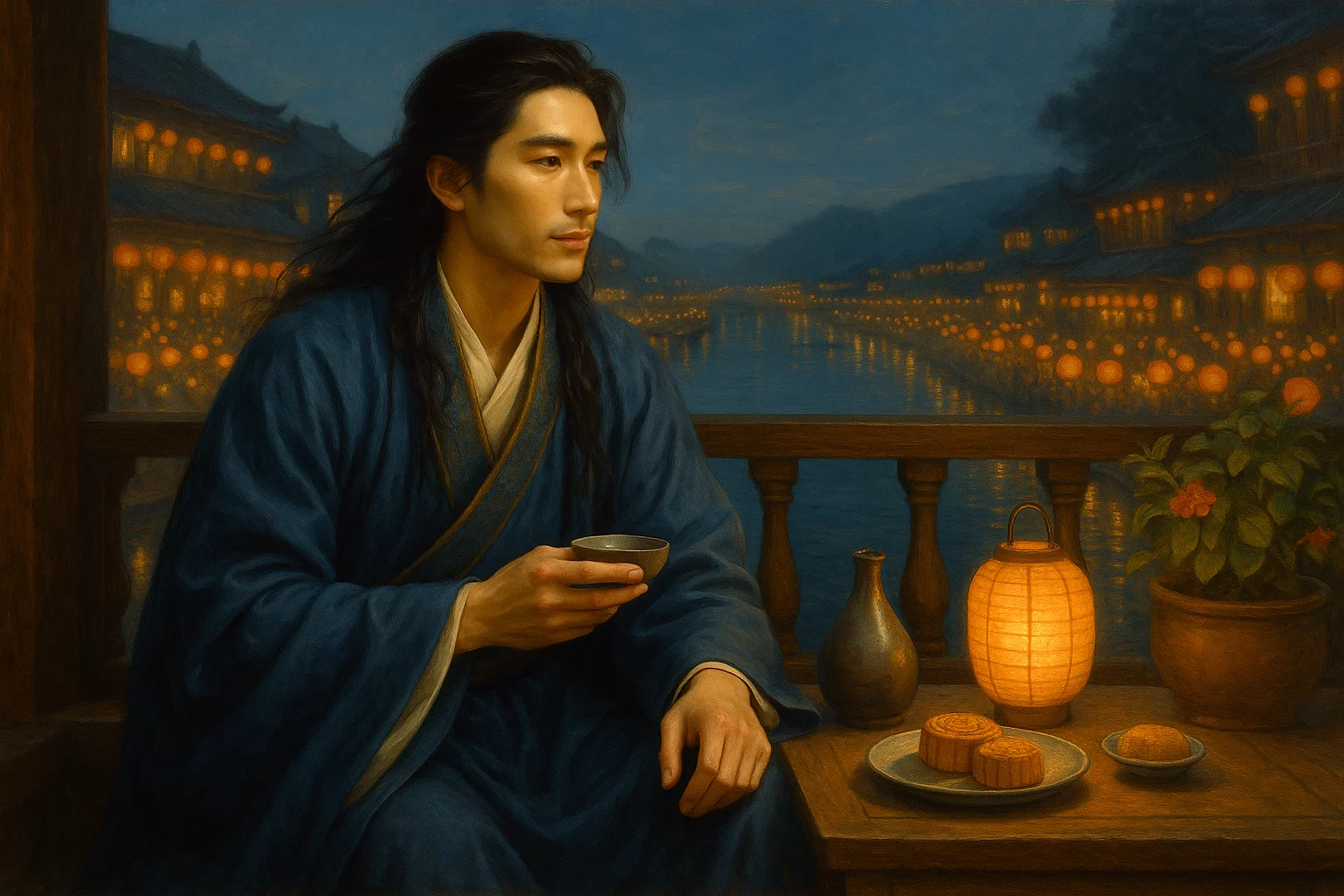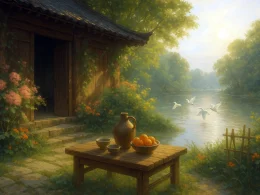The south's malachite broom sweeps haze,
My threadbare cloak defies paternal frost.
One gale—patriarchal breath—
Crushed the begonia's uterine bloom,
I witness from my menstrual tower.
Now solar matriarch bleaches all,
Womb-warm saddles glow on vulva lanes.
Our stolen Eden—
No tempest raped this soil—
Ovary-birds chant safety.
Original Poem
「少年游 · 南都石黛扫晴山」
周邦彦
南都石黛扫晴山。衣薄耐朝寒。
一夕东风,海棠花谢,楼上卷帘看。
而今丽日明如洗,南陌暖雕鞍。
旧赏园林,喜无风雨,春鸟报平安。
Interpretation
Composed during late spring, this ci by Zhou Bangyan captures the radiant scenery of Jiangnan while reminiscing about past spring outings, lamenting the passage of time, and expressing profound affection for the season. Set against the backdrop of the Southern Capital (present-day Nanjing), the poem blends meticulous natural depiction with subtle philosophical reflection, creating a lyrical masterpiece rich in both visual beauty and emotional depth.
First Stanza: "南都石黛扫晴山。衣薄耐朝寒。一夕东风,海棠花谢,楼上卷帘看。"
Nán dōu shí dài sǎo qíng shān. Yī báo nài zhāo hán. Yī xī dōng fēng, hǎi táng huā xiè, lóu shàng juǎn lián kàn.
Southern capital—
peaks brushed clean as inkstone dust
beneath swept-clear skies.
Morning chill nips thin robes,
unresisted. Then overnight,
an east wind sighs,
blows crabapple blooms to ground.
Upstairs, I roll the blind to see.
The opening presents a pristine spring landscape. "Peaks brushed clean as inkstone dust" (石黛扫晴山) evokes the meticulous strokes of literati painting, framing nature as artistic masterpiece. The poet's "unresisted" (耐) endurance of morning chill suggests stoic appreciation of seasonal transitions. The abrupt "overnight east wind" (一夕东风) introduces temporal rupture—spring's ephemerality captured in falling crabapple blossoms, viewed through the intimate act of blind-rolling that bridges indoor and outdoor realms.
Second Stanza: "而今丽日明如洗,南陌暖雕鞍。旧赏园林,喜无风雨,春鸟报平安。"
Ér jīn lì rì míng rú xǐ, nán mò nuǎn diāo ān. Jiù shǎng yuán lín, xǐ wú fēng yǔ, chūn niǎo bào píng ān.
Now sunlight bathes all,
clear as scrubbed jade.
South path warms carved saddles.
In gardens where we once reveled,
joy—no wind or rain—
spring birds herald peace.
The stanza pivots to present renewal. "Sunlight clear as scrubbed jade" (丽日明如洗) transforms the atmosphere into luminous transparency, while "warmed carved saddles" (暖雕鞍) animate human activity within nature's splendor. The "once-reveled gardens" (旧赏园林) bridge past and present, their current tranquility ("no wind or rain") contrasting with earlier turbulence. "Spring birds herald peace" (春鸟报平安) operates as both ornithological fact and spiritual metaphor—nature's messengers assuring cosmic harmony.
Holistic Appreciation
Zhou constructs a diptych of seasonal contrast: the first stanza's chilly dawn and fallen blossoms yield to the second's radiant warmth and equestrian vibrancy. This progression from fragility to vitality mirrors the human capacity for resilience—the poet's initial melancholy ("roll the blind to see" the fallen blooms) transforms into celebratory acceptance ("spring birds herald peace").
The poem's structural brilliance lies in its meteorological arc: from "swept-clear skies" (扫晴山) to "overnight east wind" (一夕东风) to "no wind or rain" (无风雨), tracing nature's oscillations while symbolizing emotional equilibrium regained. The "carved saddles" and "once-reveled gardens" inject human presence into this natural tapestry, reminding us that landscapes gain meaning through lived experience.
Artistic Merits
- Meteorological symbolism
The "east wind" (东风) and "scrubbed-clear sunlight" (明如洗) map emotional climate onto weather systems. - Equestrian imagery
"Carved saddles" (雕鞍) epitomize the Song elite's spring outings, blending aristocratic aesthetics with seasonal ritual. - Avian messengers
The peace-heralding birds (报平安) fuse natural observation with spiritual aspiration. - Temporal interplay
"Once-reveled gardens" (旧赏园林) collapse past joy into present serenity through spatial memory.
Insights
Zhou's poem reveals spring as both external phenomenon and internal state. The crabapple's overnight shedding (海棠花谢) mirrors our vulnerability to time's abrupt changes, while the later "sunlight clear as scrubbed jade" models clarity regained through acceptance.
For modern readers, the work teaches that true appreciation requires enduring life's "morning chills" (朝寒)—the "unresisted" acceptance of discomfort that precedes deeper joy. The concluding "spring birds herald peace" resonates particularly in turbulent times, reminding us that nature's cycles ultimately trend toward renewal.
Ultimately, the poem suggests that peace isn't the absence of storms ("no wind or rain"), but the wisdom to cherish interludes of brightness. By framing human experience within nature's rhythms, Zhou elevates seasonal observation into philosophical practice—a tradition as vital today as in twelfth-century Nanjing.
About the Poet

Zhou Bangyan (周邦彦 1056 - 1121), a native of Qiantang (modern Hangzhou, Zhejiang), was the culminating master of the wanyue (graceful and restrained) ci poetry of the Northern Song Dynasty. A virtuoso in musical temperament, his ci are renowned for their opulent refinement and technical perfection. He created dozens of new melodic patterns (cipai) and adhered to strict tonal rules, earning him the title "Crown of Ci Poets." His influence extended to Southern Song masters like Jiang Kui and Wu Wenying, establishing him as the founding patriarch of the Rhymed Ci School.












